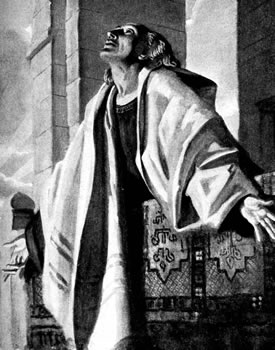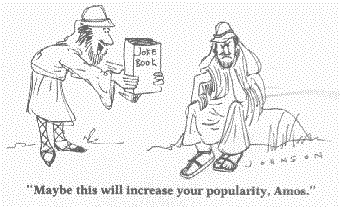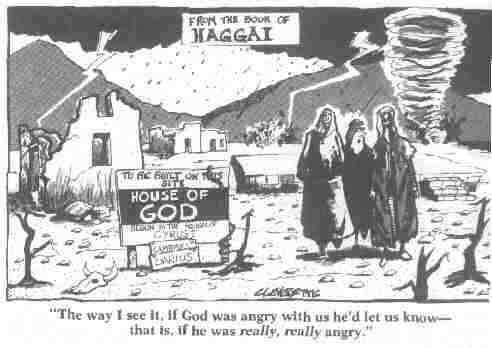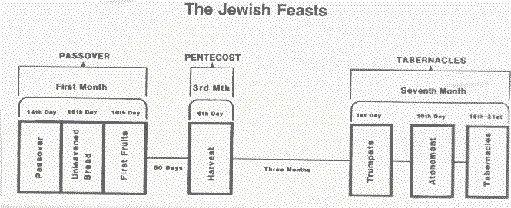
Types of Prophecy
and Prophecy in Type
The marvelous variety
of Bible prophecy
Dr.
David R. Reagan

Hebrews 1:1 says that God
spoke through the prophets "in many portions and in many
ways." Have you ever stopped to think about the variety of
people and ways which God used?
Writing
Prophets
Of course, the method that
immediately comes to mind is the written form. The prophets who
wrote their messages are the ones we know best - people like Isaiah,
Jeremiah, Ezekiel, Daniel, and the so-called "Minor Prophets"
like Habakkuk and Zephaniah. In theNew Testament the writing prophets
include Paul, Peter, and John.
But to lump all these writing prophets together into one broad
category is misleading, for there is a great variety of people
and styles among them.
As to people, the variety is astounding. The prophets range from
uneducated farmers like Amos to sophisticated poets like Isaiah,
from cowards like Jonah to men of great courage like Daniel, from
the little known like Joel to the famous like King David.
There is an equal variety in the styles of writing. Some, like
Ezekiel, Daniel, Haggai, and the New Testament prophets, primarily
used a prose style. Others, like David, Isaiah, Joel, and Micah,
expressed their ideas in poetic form. And then there are the preachers
whose books are mainly collections of sermons - prophets like
Jeremiah, Amos, and Zechariah.
Most were given direct revelations - "Thus says the Lord."
Others received their insight through dreams and visions. Some,
like Hosea and Jonah, mainly recorded their experiences.

Speaking
Prophets
Some of the most important
prophets wrote nothing at all, at least nothing that has been
preserved. We know about them because others wrote about their
revelations, pronouncements, and exploits. Elijah and his successor,
Elisha, fall into this category, as does Samuel.
So does the greatest prophet who ever lived - the Prophet foretold
by Moses (Deuteronomy 18:15-18). I'm speaking, of course, of Jesus
Christ (Matthew 21:11). The only writings of Jesus that we have
are His seven letters to the seven churches of Asia, recorded
by John in Revelation 2 & 3. The bulk of Jesus' prophecies,
like His Olivet Discourse (Matthew 24, Mark 13, & Luke 21),
were written by His disciples. Jesus was an oral prophet.
Most of the oral prophets are not well known. Only a few are mentioned
in the New Testament like the four daughters of Philip (Acts 21:9)
and Agabus, the prophet who counseled Paul (Acts 21:10).
But the Old Testament is full of oral prophets. There is Nathan,
who confronted David (2 Samuel 12); Micaiah, who saw the Lord
sitting on His throne (1 Kings 22); Ahijah, who condemned Jeroboam
(1Kings 14); Hananiah, the false prophet who spoke against Jeremiah
(Jeremiah 28); and there are many nameless prophets like the "man
of God from Judah" who prophesied the birth of Josiah (1
Kings 13).

Acting Prophets
My favorites are the prophets
who were called upon by God to act out prophecies. Some were writing
prophets; some were oral. The point is that God would tell them
from time to time to stop writing or speaking and start acting.
God often used drama to get people's attention. For example, He
told Isaiah to go barefoot and naked for three years (Isaiah 20:2).
Yes, Isaiah was the original streaker! He used an unconventional
method to get people's attention. The message was graphic and
clear: repent or be stripped naked like Isaiah.
Jeremiah was told to wear a yoke on his neck to emphasize God's
message that King Zedekiah should submit to Nebuchadnezzar (Jeremiah
27).
Ezekiel was called on to act many times. On one occasion the Lord
told him to pack all his bags and carry them around Jerusalem
in the sight of the people as a sign that if they did not repent,
God would send them into exile (Ezekiel 12).
Another time God told Ezekiel to lie down on the ground on his
left side for 390 days, one day for each year of the iniquity
of Israel. When he finished that ordeal, God told him to turn
over and lie on his right side for 40 days, for the 40 years of
Judah's iniquity (Ezekiel 4:4-8).
The Lord even ordered Ezekiel to play in a sand pile! God told
him to label a brick, "Jerusalem," and to build dirt
ramps around the brick to illustrate the coming siege of the city,
if the people did not repent (Ezekiel 4:1-3).
Ezekiel's hardest acting assignment came when the Lord revealed
that his wife would soon die. The Lord ordered him not to mourn
or weep for her. He was to continue with his activities as if
nothing had happened. When the people came to him and asked why
he was not mourning, the Lord told him to say that if they did
not repent, they would be overcome by a conqueror so rapidly that
they would not have time to mourn or weep.
The
Prophetic Oscar
The greatest actor of all,
the one who will undoubtedly win the prophetic oscar for best
performance, was the prophet Hosea.
God told him to find a prostitute and marry her. It must have
been one of the hardest things God ever asked a righteous man
to do. Hosea obeyed, and God told him to preach the message of
his action.
The message was that Israel was like that prostitute when God
selected them as His Chosen People. They were not selected for
their beauty or wisdom or righteousness. They had no merit. They
were selected by grace.
This was an insulting message for the Jews. They did not understand
what being "Chosen" meant. They thought they were better
than other peoples, and in their spiritual arrogance, they refuse
to listen to God's prophets who were calling for repentance.
When Hosea returned home from his preaching tour, he discovered
that his wife had succumbed to her old passions. She had left
the dignity and honor of his home and had returned to the streets,
selling herself to the highest bidder. Hosea's heart was broken.
God told him to preach the message of her action. The message
was, that like Hosea's wife, Israel had been unfaithful to God,
chasing after foreign gods. And like Hosea, God's heart was broken.
When Hosea returned home, God spoke to him again and asked him
to do something incredible. God told him to swallow all his pride
and go to the city square and bid for his wife when she offered
herself for sale. He was instructed to pay all he had, if necessary,
to redeem her from harlotry.
She didn't deserve it. She had not repented. But Hosea obeyed.
He paid the price, and she was redeemed.
Thus, God used an acting prophet to act out the story of what
He would do for us at the Cross when He paid the price of His
Son to redeem us from our unfaithfulness.
Symbolic
Prophecy
A fourth type of prophecy
is symbolic prophecy, or what is often referred to as "prophecy
in type."
An understanding of prophetic types is essential to an understanding
of the Old Testament. Jesus can be found on almost every page
of the Old Testament, if you know how to look for Him. He is there
symbolically in types.
Looking for Jesus and finding Him in these types causes the Old
Testament to come alive. I'm convinced that this the kind of special
teaching that Jesus gave His disciples during the 40 days between
His resurrection and His ascension (Luke 24:45).
There are three kinds of prophetic types: 1) individual lives;
2) historical events; and 3) inanimate objects.
Persons
Almost every major person
in the Old Testament is a type of Christ in the sense that some
events in their lives were prophetic of things that would happen
to Jesus.
Take Joseph for example. He was rejected by his brethren. He was
left for dead but was "resurrected" from the pit into
which he had been cast. He took a Gentile bride and then redeemed
his brethren from their famine.
Likewise, Jesus was rejected by his brethren (the Jews), experienced
death and resurrection, is now taking a Gentile Bride (the Church),
and will soon return to save a remnant of His brethren from their
spiritual famine.
Events
Prophecies about Jesus are
also symbolized in major historical events.
Take the seven feasts of Israel for an example. Jesus was crucified
on the feast of Passover. He became our "unleavened bread"
as His body rested in the ground on that feast day. He arose from
the dead on the feast of First Fruits. And the Church was established
on the feast of Pentecost.

The three unfulfilled feasts
(Trumpets, Atonement, and Tabernacles) must, in like manner, point
to events that are yet to occur most likely, the Rapture, the
Second Coming, and the Millennial Reign of Jesus.
The history of the Jewish nation is the story of Jesus in prophetic
type. The Children of Israel were born in Canaan, descended into
Egypt, came through the Red Sea (the Baptism of Moses), endured
testing in the wilderness, and then entered the Promised Land.
Likewise, Jesus was born in Canaan, descended in to Egypt, emerged
publicly at His< baptism, endured the wilderness temptations,
and led the way to Heaven.
Things
Even inanimate objects like
the Tabernacle and the robe of the High Priest are prophetic types
pointing to Jesus.
Consider the Ark of the Covenant. Everything about it was symbolic
of the Messiah. It was made of wood, indicating the Messiah would
be human. It was overlaid with gold, signifying the Messiah would
be divine. It contained three objects - the tablets of stone,
a pot of manna, and Aaron's rod that budded. The tablets signified
that the Messiah would have the law of God in His heart. The manna
meant the Messiah would be the Bread of Life. The rod with blooms
was a prophecy that the Messiah would arise from the dead.
The lid of the Ark was called the Mercy Seat. It had a golden
angel at each end. The angels faced each other and their wings
hovered over the lid. Once a year the High Priest sprinkled blood
on the Mercy Seat and communed with the Shekinah glory of God
which hovered above the angels.
The Mercy Seat pointed to the fact that through the work of the
Messiah the mercy of God would cover the Law. The blood foreshadowed
the fact that the Messiah would have to shed His own blood to
atone for our sins.
Jesus fulfilled every prophetic type of the Ark. He was God in
the flesh (John 10:30). He had the Law in His heart (Matthew 5:17).
He declared Himself to be the "Bread of Life" (John
6). He shed His blood on the Cross and was resurrected in power,
atoning for our sins and covering the Law with Grace (Romans 3:21-26).
Mary saw the fulfillment of the Ark when she went to the tomb
and discovered the body of Jesus missing. In John 20:11-12 its
says she looked into the tomb and "beheld two angels in white
sitting, one at the head, and one at the feet, where the body
of Jesus had been lying." Do you understand what she saw?
She saw the "mercy seat" where the blood had been spilled,
with an angel at each end exactly like the Mercy Seat that covered
the Ark!
As you can see, prophetic types bring the Old Testament alive
and give us deep insights into New Testament events.